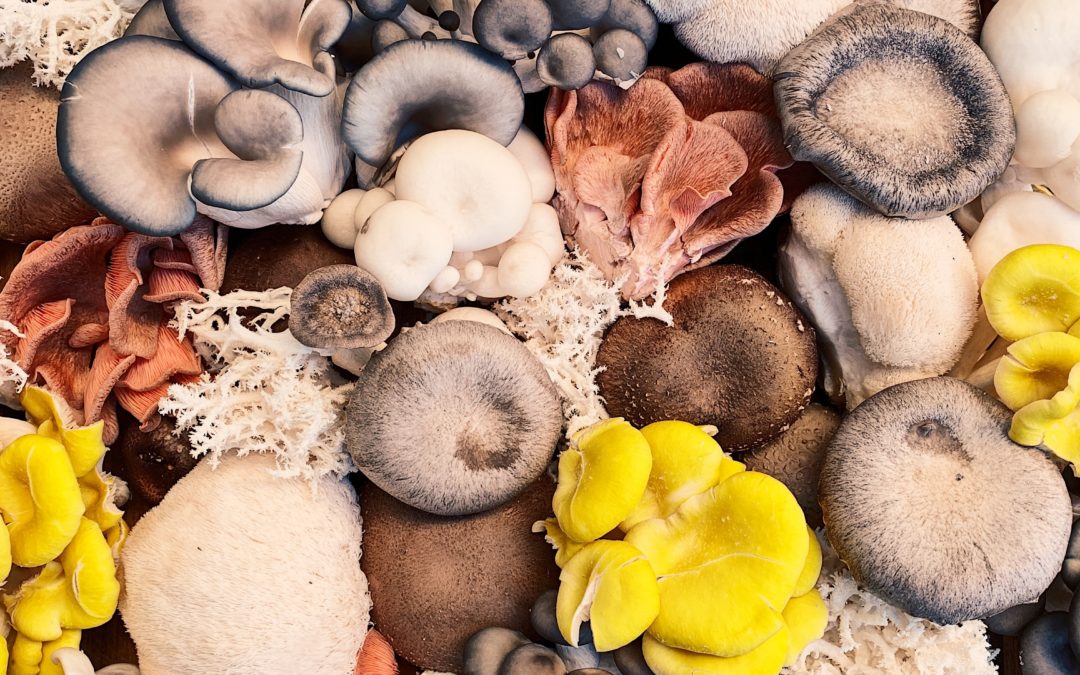If you have followed me for any length of time, you know by now that I have a passion for mushrooms, especially the adaptogenic and medicinal varieties.
Mushrooms are such an incredibly nutrient dense food, that they deserve their own food category. The consumption of mushrooms goes back to the earliest known recordings of history. They have been consumed both as food and as a powerful medicinal, used treat a variety of health conditions across time. Mushrooms pack quite the nutritional punch! They are rich in B vitamins, Vitamin D, calcium, magnesium, zinc, iron, selenium, potassium, manganese, copper, & phosphorus. Considering the impressive combination of nutrients, and the few calories they contain, this makes them a nutritional powerhouse!
Mushrooms are also rich in a number of phenolic compounds, which have strong anti-inflammatory, antioxidant, anti-cancer, anti-bacterial, and anti-fungal capacities. Mushrooms have been shown to be protective of conditions such as hypertension, diabetes, obesity, cancer, bone loss, depression, kidney disease, immune dysregulation, and intestinal inflammation. This all sounds quite impressive, and we should consume mushrooms for these capabilities alone. But mushrooms become even more powerful when we look deeper at their unique fiber content. It is this special fiber that makes them so important to our overall gut health, and in turn our physical and mental health.
Mushrooms contain 50% carbohydrate, and three kinds of fiber that make them fabulous for gut health: Chitin, Chitosan, and Beta-glucans.
Chitin
Chitin is a fermentable oligosaccharide, shown to support the growth of beneficial species of microbiota including Bifidobacterium, Lactobacillus, Akkermansia, and Bacteroides, while also reducing the quantity of inflammatory microbes. Research also demonstrates that Chitin supports the integrity of the gut barrier.
Chitosan
Chitosan has been shown to increase the diversity of beneficial gut microbes, including Bacteroides and Akkermansia. It has also been shown to reduce levels of Firmucutes (a bacterial strain which can play a role in obesity and type II diabetes), and other pathogenic strains of bacteria. Some research shows it plays a role in the suppression of Helicobacter (or H. Pylori), an infection that is often at the root of many digestive disturbances.
Beta Glucans
Mushroom are a rich source of Beta-Glucans, which have been found to feed beneficial gut microbes, and significantly increase levels of the short chain fatty acid (SCFA) byproducts butyrate and propionate. These SCFAs have powerful health benefits. Research also shows that beta gluons help to increase a number of beneficial bacterial strains (e.g., Lactobacillus, and Bifidobacterium), and reduce opportunistic strains (e.g., Clostridium & Firmicutes). So you can see that Beta-Glucans exert a powerful ability to reverse gut dysbiosis and help maintain the integrity of the gut barrier. They have also been shown in research to play a role in reducing obesity, supporting the immune system.
Needless to say, the benefits of the fiber in mushrooms to the gut microbiome demonstrates that they are something we should definitely be adding to the diet on a regular basis. There are a variety of mushrooms available on store shelves (both fresh and in powdered or supplemental form). Excellent varieties to add to the diet include, reishi, turkey tail, chaga, white, oyster, cremini, enoki, mistake, portabella, and shiitake.
I drink a high quality Reishi mushroom coffee daily, and I’d be happy to share more about it if you are interested! It’s so good that I don’t drink regular coffee anymore!
Also, I’d love to hear about what mushrooms you add to your diet, and the positive impact you feel as a result!



Recent Comments